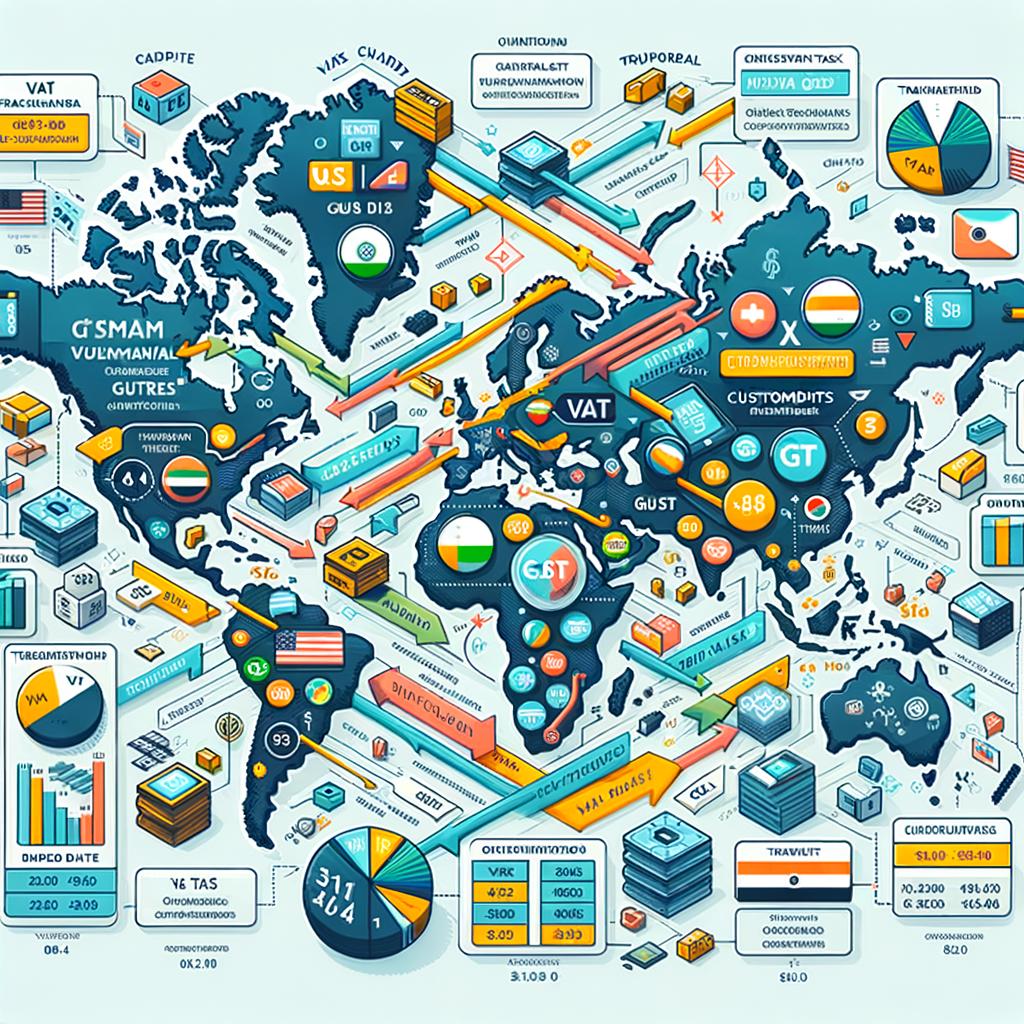Navigating Tax Implications in International Card Transactions
Trotting the globe, swiping your card with a carefree smile and a blissful ignorance of the looming tax implications – we’ve all been there. Unbeknownst to most adventurers, each international card transaction comes with a secret surprise, and no, it’s not a postcard from the taxman’s vacation in the Bahamas. From the sandy shores of Bali to the bustling streets of Tokyo, understanding the ins and outs of tax implications in international card transactions is the ultimate globetrotter’s superpower. So, grab your passport, dust off your detective hat, and prepare to navigate the tangled web of cross-border commerce like a true international tax connoisseur! Welcome to our guide on navigating the treacherous seas of taxes, where curiosity is rewarded and confusion is vanquished. Get ready to embark on a tax adventure like no other!
Tax Implications of International Card Transactions: What You Need to Know
Navigating Tax Implications in International Card Transactions
When it comes to international card transactions, understanding the tax implications is crucial. Whether you’re a frequent traveler or an online business owner, being aware of the tax obligations and regulations can save you from potential headaches down the road. Here are a few key points to keep in mind:
- Foreign Exchange Rates: Fluctuating exchange rates can have an impact on your transactions. It’s important to keep track of these rates and factor them into your calculations, especially when dealing with multiple currencies.
- VAT and Sales Tax: Different countries have varying rules and rates when it comes to value-added tax (VAT) or sales tax. Make sure you understand the tax laws in the country where the transaction occurs to determine if and how much tax needs to be paid.
- Withholding Tax: In certain cases, international transactions may be subject to withholding tax. This tax is deducted at the source, meaning that a percentage of your payment could be withheld by the foreign entity. Familiarize yourself with the regulations to avoid any surprises.
When it comes to international card transactions, knowledge is power. By staying informed about the tax implications, you can ensure compliance and avoid unnecessary penalties. Remember to consult with a tax professional or accountant to navigate the complexities and ensure that your international card transactions are handled smoothly from a tax perspective.
Understanding Cross-Border Tax Laws and Reporting Requirements
When it comes to making international card transactions, it’s important to navigate the complex world of cross-border tax laws and reporting requirements. Failing to do so could lead to unforeseen tax implications and potentially costly penalties. So, to ensure you stay on the right side of the taxman and make the most out of your international financial endeavors, here’s a breakdown of what you need to know.
Understanding Tax Laws
When conducting international card transactions, it’s crucial to familiarize yourself with the tax laws of both your home country and the country you’re conducting business with. Below are some key points to consider:
- Determining tax residency: Determine in which country you are classified as a tax resident, as it affects your tax obligations and reporting requirements.
- Exchange rates: Keep in mind that currency exchange rates can impact the tax calculations for your transactions, so it’s essential to use accurate rates for reporting.
- Tax treaties: Understand any tax treaties or agreements that may exist between your home country and the country where the transaction occurs. These treaties can provide relief from double taxation and affect reporting obligations.
Reporting Requirements
Properly reporting your international card transactions is crucial to maintaining compliance and avoiding unnecessary penalties. Here are some key reporting requirements you should be aware of:
- Foreign bank account reporting (FBAR): If you have financial accounts in foreign countries exceeding certain thresholds, you may need to file an FBAR with the appropriate tax authority.
- Foreign Account Tax Compliance Act (FATCA): If you are a U.S. taxpayer and hold foreign financial assets above certain thresholds, you may need to report them with the IRS using Form 8938.
- Country-specific reporting: Different countries may have their own reporting requirements for international card transactions. Be sure to research and understand the specific obligations of each country involved in your transactions.
Navigating VAT, GST, and Customs Duties on International Card Transactions
When it comes to international card transactions, there are several tax implications to be aware of. Understanding and navigating through the complexities of Value Added Tax (VAT), Goods and Services Tax (GST), and Customs Duties is crucial for businesses and individuals alike. Here, we break down the key points to help you navigate the world of international card transactions and avoid any potential pitfalls.
VAT:
- VAT is a consumption tax applied to the sale of goods and services in many countries.
- When making international card transactions, it’s important to determine whether VAT applies and at what rate.
- The VAT rate varies from country to country, so it’s essential to research and confirm the specific rates for the destinations involved in your transactions.
- VAT compliance can be challenging, but there are tools and resources available to assist you in calculating and reporting VAT correctly.
GST:
- Goods and Services Tax (GST) is similar to VAT and is applied in many countries, including Australia, New Zealand, and Canada.
- Just like with VAT, you need to determine whether GST applies to your international card transactions and at what rate.
- It’s important to be aware that the GST rate may differ from the VAT rate, so make sure to verify the applicable rates for the countries involved.
- Consider seeking professional advice to ensure compliance and to avoid unnecessary penalties or complications.
Customs Duties:
- When goods are imported or exported, customs duties may be imposed by the respective countries.
- Customs duties are based on factors such as the nature of the goods, their value, and the relevant customs regulations.
- These duties can significantly impact the cost and profitability of international card transactions, so it’s crucial to understand the duty rates of the countries involved.
- Consider consulting with customs specialists to ensure compliance and to optimize your international card transaction processes.
Navigating the world of VAT, GST, and Customs Duties on international card transactions requires careful attention to detail. By staying informed, leveraging available resources, and seeking professional guidance when needed, you can ensure compliance and minimize the potential financial and administrative burdens associated with global transactions.
Expert Tips to Minimize Tax Liabilities in Global Card Sales
So, you’ve expanded your business globally and your online store is now processing card sales from customers all around the world. While this is an exciting milestone, it’s essential to be aware of the tax implications that come with international card transactions. Fear not! We’ve rounded up expert tips to help you minimize your tax liabilities and navigate the complex world of global card sales.
1. Research local tax laws: Before venturing into new markets, take the time to understand the tax regulations specific to each country you operate in. Don’t rely on assumptions or general knowledge; consult with local tax experts who can provide tailored advice based on your business needs. It’s crucial to register for the appropriate tax identification numbers in each country to avoid legal complications.
2. Utilize tax treaties: Many countries have tax treaties in place to avoid double taxation for international businesses. These treaties define which country has the primary right to tax certain types of income. Investigate whether your home country has tax agreements with the countries you operate in and take advantage of these arrangements to minimize your tax liabilities.
| Country | Tax Treaty Percentage |
|---|---|
| United States | 0% |
| United Kingdom | 5% |
| Germany | 10% |
| France | 15% |
3. Understand VAT and GST: Value Added Tax (VAT) and Goods and Services Tax (GST) are common in many countries. Be aware of the thresholds for VAT/GST registration and compliance, as they vary from country to country. If you exceed these thresholds, ensure that you register and charge the proper tax rates to avoid penalties. It’s advisable to seek assistance from experts who can help navigate the complexities of VAT and GST obligations.
Implementing these expert tips will not only save your business time and money but also ensure compliance with tax regulations worldwide. Remember, educating yourself about global tax requirements is key to avoiding surprises and potential legal issues down the line. Bon voyage on your international business journey!
To Conclude
And that, my fellow global nomads, brings us to the end of our wild ride through the intricate world of navigating tax implications in international card transactions. We hope you’ve armed yourselves with enough knowledge to conquer any tax hurdles that may come your way.
Remember, whether you’re jet-setting across the globe or simply making online purchases from abroad, understanding the tax rules and regulations is crucial. Tread lightly, but fear not! With a little bit of know-how, you can steer clear of those sharp tax curves and sail smoothly towards financial success.
Just think about it – you’re now equipped with the power to unlock new business opportunities overseas, explore exotic lands without the headache of unexpected tax bills, and embrace the freedom that comes with being a savvy international spender. From hidden fees to value-added taxes, no fiscal challenge will catch you off-guard.
So go forth, intrepid adventurers! Let your global ambitions soar high, for you now hold the key to unravelling the mysteries of international tax implications. Dive into the depths of this vast ocean armed with the assurance that you can navigate your way through any tax storm that may come your way. Remember to keep an eye on the horizon and adapt to the ever-changing tides of international taxation.
We hope this article has left you feeling empowered, armed with the knowledge to conquer the intricacies of tax obligations in international card transactions. As you embark on your own exciting odyssey, may the winds of fiscal responsibility guide you safely and soundly ashore. Bon voyage, fellow wanderers, and may your international card transactions be as smooth and tax-efficient as can be!






